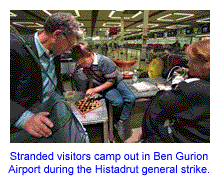|
In Contempt of Court
By Nathan Lewin
The abrupt end of the recent Histadrut strike in Israel is being viewed
Attorney General Elyakim Rubinstein briefly entered the arena to
declare, entirely correctly, that the Histarut's decision to defy a
labor court order had brought Israel to the verge of anarchy. Bending to
the public clamor to end the strike, the labor court swallowed its
pride. It chose not to uphold its own decree and invited Peretz, who had
flouted the earlier court orders, to negotiate under its aegis with the
finance minister. This was a short-sighted capitulation to immediate
needs.
In typical Israeli style, the country lurched through the tumultuous
crisis and it will now accept the restoration of the daily routine
without learning any lessons. The work stoppage, its enormous cost, and
its gross disruptions and inconveniences will be written off as the cost
of giving in to a vigorous labor constituency. The court orders
prohibiting the Histadrut from calling a strike will be quickly
forgotten and end up in the trashbin of history.
That will be a great tragedy and an invitation to repeated incidents of
this kind. Bad enough that visitors to Israel and residents of the
country refer wryly to the unpredictability of frequent labor stoppages.
Israel's detractors will, inevitably, cite these recent events as proof
that it is truly a banana republic, in which the elected government and
the courts are powerless to prevent unlawful conduct that can grind the
nation's economy to a halt.
When the United States was faced with a similar challenge 50 years ago,
the Supreme Court forcefully repudiated the shenanigans of an American
counterpart of Amir Peretz. The president of the United Mine Workers of
America, a fiery, beetle-browed labor leader named John L. Lewis, made a
career of defying the federal government and the courts. Coal-mining was
an essential industry in post-WWII America, and Lewis' militant rage and
pension demands, backed up by frequent walk-outs, threatened to disrupt
the economic transition from war to peace. President Harry Truman
ordered the federal government to take over America's coal mines in May
1946. This led to the signing of a labor contract between Lewis and the
secretary of the interior.
Lewis unilaterally terminated the contract five months later and
demanded better terms for his union members. The government claimed the
agreement was still in effect but agreed to negotiate. In order to
strengthen his hand in the new talks, Lewis called a national strike.
The government went to court to prevent the strike and, without
notifying Lewis or giving him an opportunity to be heard, a district
judge issued an order prohibiting the strike for 10 days. Lewis ignored
the order and struck.
The government didn't negotiate with Lewis. It went to court to seek
civil and criminal contempt remedies against Lewis and his union. After
a brief trial, the defendants were found guilty. Lewis was fined $10,000
(a hefty sum in those days ) and the union... $3.5 million. The
district court again prohibited the strike.
It's an accepted proposition of American law "that an order issued by a
court with jurisdiction over the subject matter and person must be
obeyed by the parties until it is reversed by orderly and proper
proceedings." Lewis and his union were heavily fined for their disregard
of the court order. Even Justice Felix Frankfurter, who agreed with
Lewis' ultimate legal argument that the district court had no power to
issue the injunction, said that in a "government of laws and not of men"
an order of a court may not "be disobeyed and treated as though it was a
letter to a newspaper."
Frankfurter's warning could well be applied to Peretz' maneuverings and Israel's judicial
system: "There can be no free society without law administered through
an independent judiciary. If one man can be allowed to determine for
himself what is law, everyone can. That means first, chaos, then
tyranny."
 as a triumph for Amir Peretz and the Histadrut and a defeat for Yaakov
Ne'eman and the Finance Ministry. Little attention, however, is being
paid to the rule of law. It was the greatest loser.
as a triumph for Amir Peretz and the Histadrut and a defeat for Yaakov
Ne'eman and the Finance Ministry. Little attention, however, is being
paid to the rule of law. It was the greatest loser.
Nathan Lewin, recently dubbed by Washingtonian magazine as the second most powerful lawyer in the capital, teaches at Columbia Law School. A former president of the American Section of the International Association of Jewish Lawyers and Jurists, he wrote the federal legislation that protects the rights of Sabbath observers. He will be a periodic contributor to JWR.